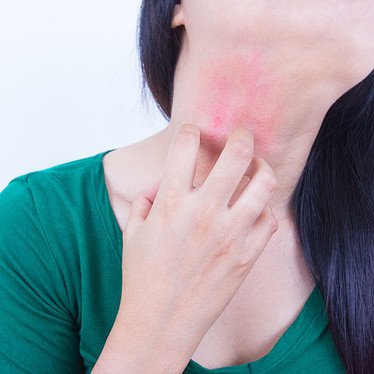Eczema (or atopic dermatitis) is an irritating skin condition characterised by patches of blotchy, rough, inflamed and itchy skin. It may flake in places, become raised or weep, with some forms taking on a circular type appearance. It is a common problem in childhood, affecting between 15-20% of the population, and often affects areas around the inner elbows and behind the knees, but may occur anywhere on the body. In severe cases the entire body may be affected, with skin cracking and bleeding leading to secondary bacterial infection and intense pain. Eczema often improves as the child grows up, but still affects around 3% of adults.
What causes it?
Despite its appearance as a condition of the skin, eczema is a complex condition primarily of the immune and gastrointestinal systems, related to other atopic conditions, e.g. asthma and allergies. It involves any of a combination of genetics, an overactive IgE allergic response to things that should normally be ‘safe’ (such as dustmites, grasses, pollens, and various foods), as well as abnormalities in the skin’s epithelial layer making it more susceptible to inflammation and infection. Alongside this there is often intestinal hyperpermeability (‘leaky gut’), and rather than being balanced with the T-helper 1 (Th1) arm, the Th2 arm of the immune system is generally stuck in a state of chronic activation, leading to an overproduction of Th2 cytokines that direct the immune system to respond abnormally to allergens. This means the immune system needs to be balanced, inflammation addressed and gut function restored before symptoms will start to resolve.
So how does the gut come into it?
The majority of the body’s immune cells are located within the gut – with others located primarily in the nose, eyes, skin, and other areas where foreign invaders may gain entry. When the mucosal lining of the gut has been compromised, such as by poor diet, stress, lack of sleep, pharmaceuticals, dysbiosis, antibiotics, and general inflammation, foreign proteins and other particles can slip through into the bloodstream in a condition known colloquially as ‘leaky gut syndrome’. This leads to systemic inflammation and a heightened immune response to these proteins, leading in turn to atopic conditions, including eczema.
As well as this, numerous ‘bad’ gut bacteria have been linked to eczema, as has overuse of antibacterial household products and antibiotics (the ‘hygiene hypothesis’), whilst certain strains of probiotics have been shown to help prevent its onset when taken by the mother during pregnancy, the most well-known being L. rhamnosus.
So what do we do about it?
There are a number of approaches to healing the body of eczema. Firstly, balancing the immune system is hugely important. Numerous nutrients involved in the immune system have been implicated in both the onset of eczema and the relief of its symptoms. These include vitamins C, E and A – all involved in skin health – and vitamin D, which the majority of kiwis are deficient in but which plays a role in the immune system’s overall functioning. Zinc and selenium are important for skin and immune health, and essential fatty acids such as those from fish and flaxseed oils are required for proper skin barrier function and may help relieve dry skin. Probiotics may be beneficial for the regulation of the immune system. Echinacea is well-known for its immune modulating properties, whereas topically licorice, gotu kola, calendula, chamomile and kawakawa have been traditionally used to heal and protect the skin as well as prevent bacterial infection.
Eating a diet rich in anti-inflammatory whole foods is also important. Avoid any food triggers whilst the body heals, and eat plenty of vegetables, fruit, meat, nuts, seeds, and healthy oils. Many people find benefit from cutting out pasteurised dairy and grains, and avoiding sugar-laden processed foods is hugely important. Bone broth is rich in gelatin, which not only heals the gut barrier, but is needed for connective tissue and healthy skin formation. Fermented foods are rich in probiotics that may help to balance the immune system and restore the health of our gut bacteria.
HealthPost carries a range of products that may help in the relief of eczema, from topical creams and ointments to control itching and address symptoms, through to herbs, nutrients and other products that may help the condition from the inside out.
We’d Love Your Feedback
Do you have any experiences with Eczema you would like to share?
If you suffer from Eczema, what usually triggers the symptoms?


